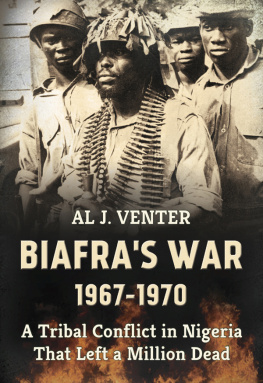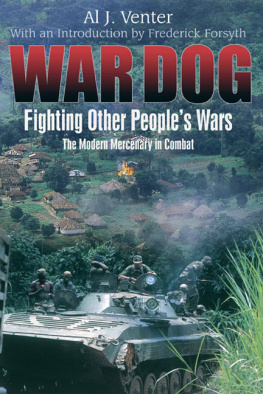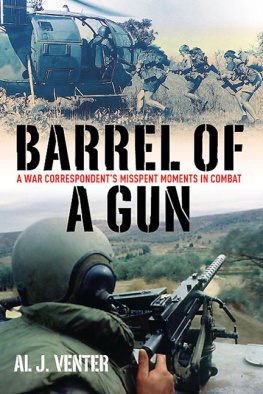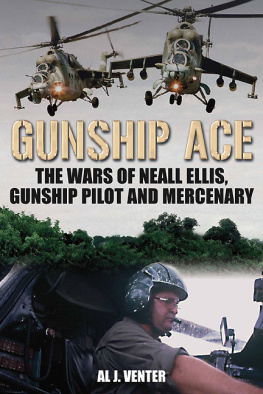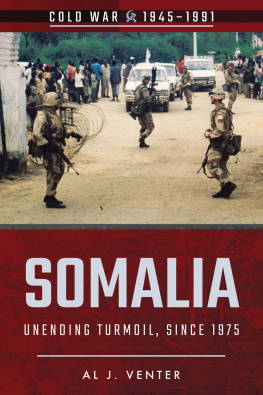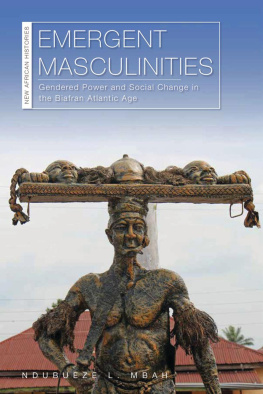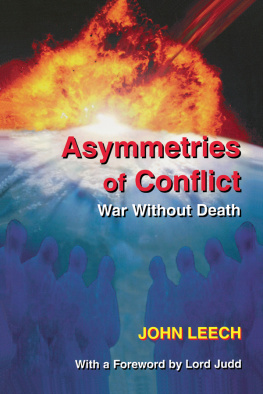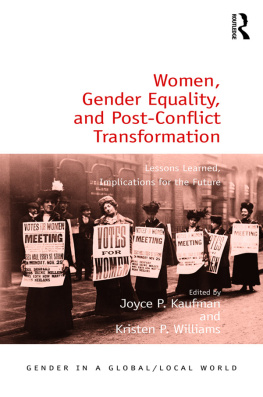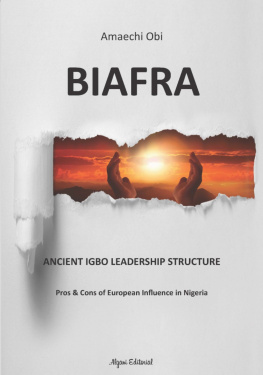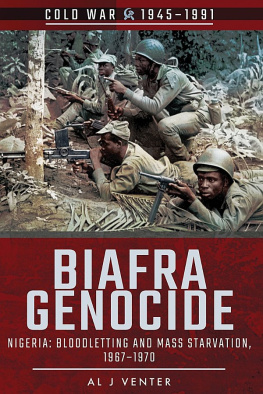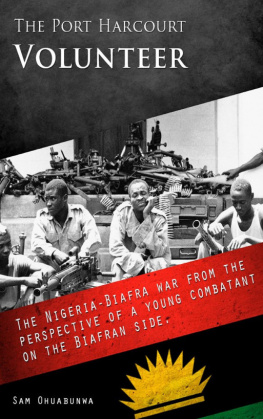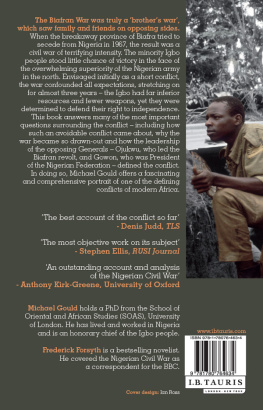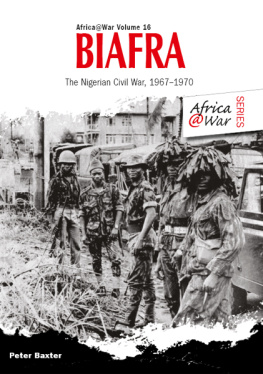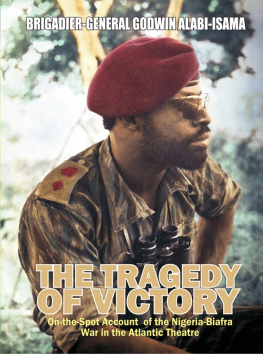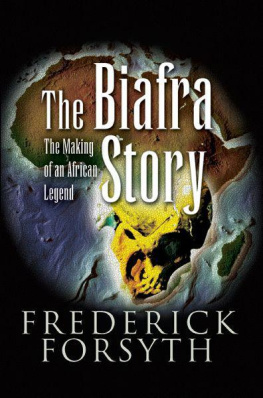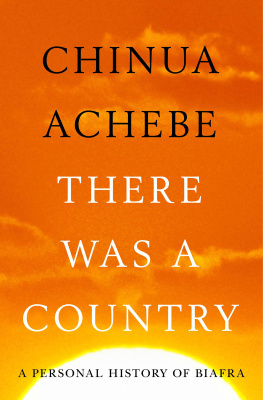
BIAFRAS WAR 1967-1970
A Tribal Conflict in Nigeria That Left a Million Dead
Books by the same author
Underwater Africa
Under the Indian Ocean
Report on Portugals War in Guin-Bissau
Africa at War
The Zambezi Salient
Underwater Seychelles
Coloured: A Profile of Two Million South Africans
Africa Today
South African Handbook for Divers
The Second South African Handbook for Divers
Challenge: South Africa in the African Revolutionary Context
Underwater Mauritius
The Ultimate Handbook on Diving in South Africa
Where to Dive: In Southern Africa and off the Indian Ocean Islands
War in Angola
The Iraqi War Debrief: Why Saddam Hussein was Toppled
Irans Nuclear Option
War Dog: Fighting Other Peoples Wars
Allahs Bomb: The Islamic Quest for Nuclear Weapons
Cops: Cheating Death: How One Man Saved the Lives of 3,000 Americans
How South Africa Built Six Atom Bombs
Dive South Africa
African Stories by Al Venter and Friends
Barrel of a Gun: A War Correspondents Misspent Moments in Combat
War Stories by Al J. Venter and Friends
Gunship Ace The Wars of Neall Ellis, Helicopter Pilot and Mercenary
Shark Stories by Al J. Venter and Friends
Portugals Guerrilla Wars in Africa
Shipwreck Stories by Al Venter and Friends
South Africas Border War (Photographs, with Willem Steenkamp)
The Chopper Boys: Helicopter Warfare in Africa (New, revised and enlarged edition due out in 2016 through Helion & Company Limited)
Battle for Angola (Scheduled for publication through Helion & Company Limited in 2016)
BIAFRAS WAR 1967-1970
A Tribal Conflict in Nigeria That Left a Million Dead
Al J. Venter
Helion & Company
Helion & Company Limited
26 Willow Road
Solihull
West Midlands
B91 1UE
England
Tel. 0121 705 3393
Fax 0121 711 4075
Email:
Website: www.helion.co.uk
Twitter:
Visit our blog http://blog.helion.co.uk/
Published by Helion & Company 2015
Designed and typeset by Bookcraft Ltd, Stroud, Gloucestershire
Cover designed by Euan Carter, Leicester ( www.euancarter.com )
Text Al J. Venter 2015
Photographs Al J. Venter unless noted otherwise
Front cover photo by Peter Obe; rear cover photo open source.
ISBN 978-1-910294-69-7
eISBN 978-1-912174-31-7
Mobi ISBN 978-1-912174-31-7
British Library Cataloguing-in-Publication Data.
A catalogue record for this book is available from the British Library.
All rights reserved. No part of this publication may be reproduced, stored in a retrieval system, or transmitted, in any form, or by any means, electronic, mechanical, photocopying, recording or otherwise, without the express written consent of Helion & Company Limited.
For details of other military history titles published by Helion & Company Limited contact the above address, or visit our website: http://www.helion.co.uk.
We always welcome receiving book proposals from prospective authors.
For Freddie, with grateful thanks
Foreword
Every war has its cathartic moments for those involved and Biafra was no exception. It was also very different from all the other conflicts Ive witnessed from up close sometimes too close, which is why I am almost deaf. In my case, this West African conflict was a life-changing experience that I never quite got over and for several reasons
Id arrived in Lagos only a week or two after the first army mutiny had taken place, when on 14 January 1966 a dissident group of junior officers mostly of Ibo extraction and led by Major Chukwuma Kaduna Nzeogwu violently overthrew the Nigerian Government.
Having been recruited as a shipping specialist by the British company John Holt, my job was largely transport-related and I was posted to Lagos Ikeja Airport the countrys international air transport hub. Only six months later was I to discover that it was at Ikeja where the second army mutiny had started to gel. The only difference this time was that it was mainly soldiers from Nigerias Islamic north who were in the driving seat. As the phrase suggests, it was payback time.
In the second retaliatory coup, the first place targeted was Ikeja Airport, followed by the headquarters of the Nigerian Police, State House, the naval headquarters at Apapa, and the offices of the national radio station. Other government civilian and military agencies and installations were taken over soon afterwards.
My first chapter details that bloody battle on the outskirts of Ikeja Airport a singular event which set off a chain of more drama that resulted in the civil war. I was on my way to work, and inadvertently I stumbled into the aftermath of that bloody early-morning fire-fight that involved dissident army units and armour. The Battle for Ikeja lasted less than an hour and was the brainchild of Lieutenant-Colonel Murtala Muhammed after whom the airport was subsequently renamed.
It is worth mentioning that prior to the second army mutiny, my job entailed a considerable amount of travel throughout Nigeria. During the course of these duties, I met a lot of people both in civilian and government roles including quite a few military types in the various hotels and bars along the way.
In those days, everybody could freely express their opinions; the all-encompassing security apparatus for which Nigeria became notorious in subsequent military governments only came afterwards. British author Frederick Forsyth told me when we got together in Washington 30 years later that he still didnt dare visit the country: Im pretty sure they would kill me if I did, were his words.
In the early days following the revolution, it didnt take much gumption to appreciate that there were some serious things taking place, both in Lagos and in Northern Nigeria. You could actually sense that another army coup was imminent. I even predicted as much in several magazines for which I was writing at the time including the now-defunct News Check , as well as the mass-circulation Huisgenoot (both published in South Africa). It is all on file for those interested in looking back on those almost forgotten chapters of Africas post-independence history.
I was also doing the odd story for United Press International in London at the time, but their editors scoffed at the premise that more Nigerian violence might follow so, apparently, did Britains intelligence agencies. Like Washington, they were (as the saying goes) caught with their pants around their ankles.

Nigerias first Prime Minister, Alhaji Sir Abubakar Tafawa Balewa, assassinated in Northern Nigeria during the Ibo-led army coup dtat in January 1966. ( New Nigerian , Kano)
When I started reporting these sentiments back to my bosses at John Holt, they were appalled. It took no time at all for the order to come down from the top: instead of meddling in political matters, you should concentrate on your work was the gist of it but then, when it happened at midnight on 29 July 1966, even the British High Commission in Lagos was found wanting. Effectively, the first shots of the Biafran War had been fired
Looking back at those events, and my subsequently going into Biafra itself my first real experience of a war it might be trite to say that I was severely affected by the plight of thousands of emaciated and starving children encountered at every turn. I was rather severely so and I dont believe I ever got over it.

